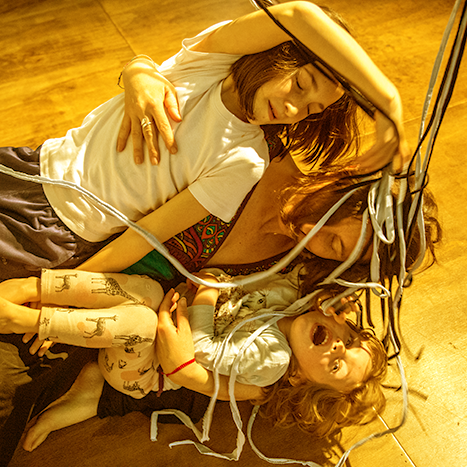Body movement
Playing with and like their children is often very tiring for many parents. Especially with very young children who, still unable to correctly verbalize their desires and needs, use their bodies to express themselves, communication becomes even more demanding. With the KidiMpro practice, both children and adults move together in space and, through the movement of the body, discover new levels of interaction and improve communication that becomes easier and more relaxed.
Improvisation techniques
In the first KidiMpro meetings, children and their relatives work strictly in pairs. They initially explore space and play with impulse and reaction, miming and echoing. Objects (possibly sounds) are slowly introduced and each participant can play with them. Children are free to use any object and adults interact with children in a safe way, giving space to children’s creativity and using this creativity as an impulse to develop their own creativity.
Feeling, remaining open, expressing yourself -regardless of what others think- in a way in which children and adults can communicate at the same levels are the basis of a performative act.
- Creativity
Non-verbal communication plays a key role in the realization of a performative act. With the KidiMpro practice, all are actors and performers – regardless of their age – and practice the same exercises, move on the same levels and establish contact through the same means of communication: body and voice.
Moving freely in space and experimenting with one’s own body in an unusual way creates an intimate process that stimulates creativity and inner growth.
- Confidence
In themselves, in the adult and in the group
The work on improvisation is based on the principle of action and reaction: since every impulse is followed by an action, this work aims to develop the ability to recognize impulses, interpret them and transform them into a performative act.
The spontaneity of a child creates multiple cues for a performative practice, cues that the adult can accept and use to create at any time. In this game of complicity, the child feels valued and approved, so that confidence in himself and in his actions increases and creates a further opportunity to establish a stronger relationship of trust between the child himself and the adult.
When the child also opens up to the group and begins to experiment with others, and not only with his parent, his confidence in the group grows, and this makes him more independent and self-confident.

